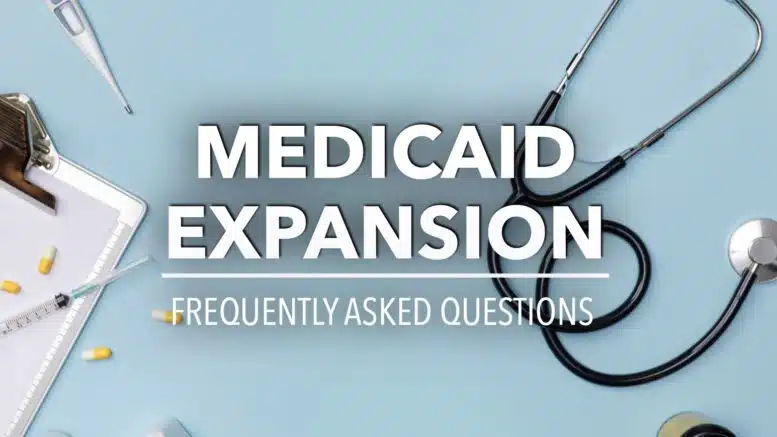By Jaymie Baxley
The N.C. Department of Health and Human Services recently announced plans to accelerate the launch of Medicaid expansion to Oct. 1, which is about three months earlier than expected.
What does that expedited timeline mean for the hundreds of thousands of people who will qualify for Medicaid under expansion? And what happens if DHHS isn’t able to pull it off?
Here are answers to those and some other questions about the agency’s new rollout strategy.
What will Medicaid expansion accomplish?
Generally speaking, it will loosen some of the state’s long-standing eligibility requirements for Medicaid and provide coverage to an estimated 600,000 low-income residents — mostly folks who are working but whose jobs don’t provide them with health insurance. Many of the newly eligible are childless adults without disabilities, a population that is effectively ineligible for coverage under the current criteria.
Expansion will raise the maximum allowed income to 138 percent of the federal poverty level, or about $20,120 a year for a single person who is older than 18 and has no children. To put that into perspective, the average annual salary for a full-time worker earning minimum wage in North Carolina is about $15,000.
Parents and caregivers will have higher income limits based on their household size. Parents in a family of three with a combined income of less than $34,000 would qualify for Medicaid under expansion, according to DHHS (their children under 18 already are eligible).
Some of the services covered by Medicaid include:
- Ambulatory patient services
- Emergency services
- Hospitalization
- Maternity and newborn care
- Mental health and substance use disorder services, including behavioral health treatment
- Prescription drugs
- Rehabilitative and habilitative services and devices
- Laboratory services
- Preventive and wellness services and chronic disease management
- Pediatric services, including oral and vision care
Expansion will boost the state’s coffers with a “signing bonus” of approximately $1.6 billion from the federal government. Lawmakers hope to spend a large chunk of this one-time incentive, which will be paid out over two years, on improving access to mental health services.
Expansion will also boost the state’s coffers with a “signing bonus” of approximately $1.6 billion from the federal government. Lawmakers hope to spend a large chunk of this one-time incentive, which will be paid out over two years, on improving access to mental health services.
Why hasn’t expansion gone into effect yet?
Gov. Roy Cooper signed expansion into law this past March, but its implementation was tied to passage of a state budget by the General Assembly.
It initially appeared that the legislature would deliver a budget by the end of the state’s fiscal year on June 30, but negotiations between the state Senate and House of Representatives have stalled. The delay has left DHHS unable to move forward with expansion.
Can expansion happen without a budget?
DHHS’ new rollout plan calls for “de-coupling” expansion from the budget if the stalemate has not been resolved by Sept. 1. This strategy would allow the agency to proceed before a budget is passed, but it will still require approval from the General Assembly.
State Health and Human Services Sec. Kody Kinsley said he has run his plan past legislative leaders, but it’s still not clear whether — if their budget deliberations stretch into September — they will create legislation to uncouple expansion from passage of the state budget.
What happens if DHHS is unable to implement expansion on Oct. 1?
North Carolina could lose a lot of money, among other ramifications.
The Healthcare Access and Stabilization Program, a time-sensitive provision of the expansion bill that will increase the rate of reimbursement for hospitals serving Medicaid patients, must launch alongside expansion. If it doesn’t, the state could lose up to $60 million in federal funding.
The $1.6 billion federal bonus for implementing expansion is also on the line. Kinsley has said the incentive will not be paid out until “we enroll our first beneficiary.”
Another risk in delaying expansion, Kinsley said, is the so-called “unwinding” of the continuous coverage requirement, a federal mandate that protected Medicaid participants from losing coverage during the first three years of the COVID-19 pandemic.
The mandate expired earlier this year, allowing states to redetermine participants’ eligibility and disenroll ineligible people for the first time since 2020. DHHS has confirmed that many people who are determined to be ineligible for Medicaid during the unwinding should become eligible again after expansion is implemented.
But with the unwinding already underway, a number of those people are likely to experience gaps in their health insurance coverage.
Tens of thousands of North Carolinians have lost coverage since the state resumed disenrollments in June, according to data from DHHS. Kinsley said at least 9,000 of those people would have remained on Medicaid if expansion was in place.
Can DHHS pause the unwinding until after expansion goes live?
That isn’t an option, according to Kinsley. He said the state, which is conducting three years’ worth of Medicaid redeterminations in monthly batches through March 2024, has already “stretched the unwinding period to the maximum amount.”
“There isn’t a necessary ability to slow down,” he said. “We are constantly looking at ways that we can try to hold people on to get them where they’re eligible. But once you start the redetermination process, we can’t stop that.”
What is DHHS doing to prepare for expansion?
As part of a compromise reached with federal officials, DHHS has begun sending public notices to Medicaid beneficiaries, health care providers and county agencies.
By notifying stakeholders now, DHHS can initiate the legally required process of soliciting comments from citizens and consulting with members of the Eastern Band of Cherokee Indians. The agency can also start training county and municipal social workers to handle the anticipated influx of newly eligible Medicaid enrollees.
Kinsley said these efforts will shorten the time needed to implement expansion, reducing what would have been a 120-day undertaking to about 30 days.
If expansion launches on Oct. 1, when will coverage start?
Kinsley told NC Health News that as many as 300,000 newly eligible residents could be moved “immediately into the expansion population” before the “go-live” date, meaning their benefits would kick in with little to no delay.
The state is working with county agencies to verify people’s eligibility ahead of the planned launch, according to Kinsley. He said the agencies will use data from SNAP, the food assistance program, and from Equifax, a credit reporting service, to identify low-income individuals who may qualify for coverage under the new requirements.
Many residents who were previously enrolled in Medicaid but were later deemed ineligible because of changes in their income or circumstances are expected to become eligible again once expansion takes effect. Reinstating coverage for these people, Kinsley said, should be a relatively simple process.
“Depending on the time window, if it’s still valid income information that we have from the most recent redetermination, we can essentially flip the switch and move them back in,” he said.












